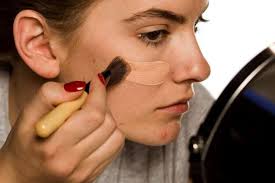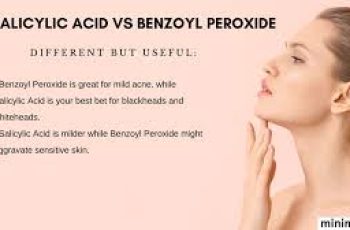Does Makeup Affect Acne?
A common misconception about acne is that it only affects teenagers. While it is true that teens tend to be more prone to acne due to rapid changes in hormones during puberty, many adults also struggle with this common skin condition. In fact, one study(4) found that an astounding 54% of women and 40% of men over the age of 25 have acne.
For women who wear makeup, acne can be even more of a challenge to treat and prevent, as makeup can contribute to acne in some cases. Before you give up makeup altogether, however, take a look at this guide explaining just how makeup can affect acne and what you can do to minimize breakouts while still wearing makeup.
Before we get started – we’re going to talk a lot about skin sensitivities and types in this blog, so make sure to find your skin type here!
Some ingredients in makeup can cause a type of acne called acne cosmetica.
Look for non-comedogenic ingredients in makeup to prevent breakouts.
Use an acne-fighting skincare regimen designed for your skin type to treat and prevent breakouts.
What Causes Acne?
There are three main causes of acne :
Excessive sebum (oil) production
Clogged pores
Overgrowth of acne-causing bacteria
When too much oil is produced by sebaceous glands in the skin, they can cause dead skin cells to become stuck together and clog pores. Clogged pores then create an environment where acne-causing bacteria called Cutibacterium acnes (formerly called Propionibacterium acnes) can thrive and overgrow. This results in an inflammatory cascade that leads to the redness, pus, and sometimes discomfort that is characteristic of an acne breakout.
It is important to note, however, that you do not have to have oily skin to get acne. People with dry skin types can also have problems with acne, as dry skin often has trouble desquamating – or shedding dead skin cells – properly. This can also lead to clogged pores and an overgrowth of C. acnes bacteria.
Can Makeup Cause Acne?
So how does makeup factor into the acne equation? There is a specific type of acne called acne cosmetica that happens when comedogenic ingredients commonly found in makeup, such as coconut oil or lanolin, clog your pores. Acne cosmetica differs from acne vulgaris in that it is distinctly caused by pore-clogging ingredients in cosmetic products applied to the skin. Thus, acne cosmetica should clear up once you stop using the product or products that are causing it, and allow your acne 8 weeks to complete its natural cycle. Of course, using a custom skin care routine is the best way to get good results quickly.
What Does Acne Cosmetica Look Like?
Acne cosmetica typically results in small, raised bumps on your skin that can be red, white, or flesh-colored. These can be pimples, whiteheads, or blackheads, and most commonly occur on the cheeks and forehead.
What’s the Best Makeup for Acne-Prone Skin?
When choosing the best makeup for acne-prone skin, look for ingredients that are non-comedogenic (meaning they won’t clog pores) and avoid ingredients like coconut oil that are known to clog pores. Some foundations for acne-prone skin also contain salicylic acid, which can help to keep pores clean and reduce inflammation.
Here are some of my favorite makeup brands for acne-prone skin include:
Makeup Ingredients to Avoid with Acne-Prone Skin
As noted above, you want to avoid makeup ingredients that are known to clog pores and can therefore cause acne. Some of the most common pore-clogging ingredients found in makeup include:
Beeswax
Cocoa butter
Coconut oil
Dimethicone
Isopropyl myristate
Isopropyl isostearate
Myristyl lactate
Red dyes
How to Prevent Acne Caused by Makeup
Even if your skin is prone to acne, there are some things you can do to help minimize and even prevent those breakouts without giving up makeup.
Choose makeup formulated for acne-prone skin and that is a match for your Baumann Skin Type. If you don’t know your skin type, take the quiz to find out before buying new cosmetic or skincare products.
Use acne-fighting skincare ingredients and products for your skin type. Salicylic acid, benzoyl peroxide, retinol, glycolic acid, and tea tree oil are common ingredients that are good for most acne-prone skin types.
Choose lighter foundations rather than heavy ones. Mineral-based powder foundations can be better choices than heavy liquid foundations if you are struggling to find a makeup for acne-prone skin.
Always remove makeup before bed. Leaving makeup on overnight can quickly clog pores and lead to breakouts.
Avoid applying makeup with your fingers. Your fingers can transfer dirt, oil, and bacteria to your face, which can contribute to breakouts. If you must apply makeup with your fingers, make sure you wash your hands first.
Keep your makeup brushes clean. Similarly, dirty makeup brushes can harbor dirt, oil, and bacteria, which can be pushed into your pores when using them to apply your makeup. Always keep all makeup brushes, sponges, and other tools clean.
Bottom Line: Can I Wear Makeup with Acne-Prone Skin?
Yes, you can wear makeup even if you are prone to breakouts. The key is to choose makeup for acne-prone skin that does not contain pore-clogging ingredients and that is a match for your skin type. You should also pair your makeup routine with an acne-fighting skincare regimen that includes products specifically formulated for your skin type to get rid of breakouts without worsening other skin problems like dryness or flaking.
DQH Knowledge drop: In your 20s, your skin cell turnover decreases. (Cell turnover is a key component in keeping your skin youthful.) You know what else slows down? Your collagen production. Starting in your 20s, collagen decreases by about 1 percent per year. Should you want to prevent fine lines and wrinkles, start by eliminating behaviors that contribute to premature aging. “If it’s bad for you, it’s bad for your skin,” says dermatologist Michel Somenek.
“Cigarette smoking reduces blood flow to the skin and causes premature wrinkling and a dull skin texture. Making the repeated pursed motion to inhale can also cause smoker’s lines. Alcohol and recreational drugs are toxins for the skin that damage its cellular structure and DNA,” Somenek tells us. “The faster you eliminate vices while you are young, the better chance your skin and body have to recuperate.” Also, adopting an anti-aging routine in your 20s is key. After all, the best offense is a good defense. We spoke to Somenek and experts Joshua Ross and Audrey Kunin to find out more.
Keep reading for the best anti-aging products for your 20s, according to skincare professionals.
Sunscreen
“We all know that the sun is the number one cause of skin aging and starting the prevention in your 20s is very important,” Ross says. “The majority of your sun damage won’t start to appear until you’re in your 30s, so don’t wait until you see it surface or you’ll be behind the curve. Stay ahead of it with a good-quality zinc-based sunscreen worn daily.”
Farmacy Green Defense Daily Mineral Sunscreen
An invisible sunscreen with SPF 30, plus botanical extracts meant to protect skin with tons of antioxidants. Bonus: It’s clean and fine to use under makeup.
Bareminerals Complexion Rescue™ Tinted Moisturizer Broad Spectrum SPF 30
Although we recommend you use your SPF and moisturizer separately, we also understand moments when you don’t have time or energy for that extra step. For those times, this bareMinerals moisturizer is a great thing to have on hand.
Vitamin C Serum
“A great introduction to anti-aging is to start with a vitamin C serum in your morning skincare routine,” Ross says. “It’s a powerful antioxidant that will neutralize free radicals and brighten the skin.” He adds that it’s a great way to counteract the effects of the sun’s harmful rays, which, as previously mentioned, are among the biggest causes of premature aging.
Drunk Elephant C-Firma™ Vitamin C Day Serum
The Drunk Elephant C-Firma is a lightweight serum that promises to give skin a glow by combining the brightening powers of vitamin C with ferulic acid, l-ascorbic acid, and vitamin E. The included sodium hyaluronate is meant to replace hydration loss, so you shouldn’t have to deal with any irritation.
Sunday Riley C.E.O. Rapid Flash Brightening Serum
This potent serum is jam-packed with vitamin C (15 percent, to be exact), which means it’s a potential superstar at both brightening skin and dousing it in antioxidants.
Peptides
Using peptides on your skin has many benefits, says Somenek. “The skin barrier is what defends the body against pollution, UV rays, bacteria, and toxins. It can be damaged by several everyday factors. Using topical peptides aids in building a stronger barrier,” he says. “Peptides comprise elastic fibers, which are a type of protein. These fibers help to make skin appear taut and firm. Peptides can also help repair damaged skin, relieve inflammation, and even out skin tone. Some peptides can kill acne-causing bacteria that is common in 20-somethings.”
Kunin agrees, saying, “Peptides are an excellent entry point for supporting collagen.” She recommends looking for face and eye treatments that contain these collagen-boosting powerhouses.
Charlotte Tilbury Magic Eye Rescue Cream
This Charlotte Tilbury super-emollient eye cream has a base of coconut oil and shea butter (read: it’s incredibly hydrating). Botanicals plus peptides are meant to help reduce dark circles and boost collagen, respectively.
This creamy moisturizer serves up potent collagen-boosting peptides and pycnogenol, and antioxidant-rich vitamin C. “Instead of sitting on top of the skin, peptides penetrate the outer layer so they go deep. The ‘signals’ they send tell the cells to produce elastin and collagen, which are needed for youthful-looking skin,” explains Somenek.
At-Home Peel Pads
Remember that skin cell turnover fiasco we talked about earlier? One way to help support it is by exfoliating. “Exfoliation is important to help keep skin fresh and luminous,” Kunin says. She recommends using at-home peel pads as an easy and effective way to exfoliate.
“The goal in your 20s is to fight the slowing pace of cell turnover. It is wise to use products that gently exfoliate, yet still remove oil and other impurities. Products that have Alpha Hydroxy Acids (AHA) or Beta Hydroxy Acids (BHA) are a good choice.”
According to Somenek, you should only exfoliate two to three times a week. “People of all ages are guilty of over-exfoliating and that can be too much of a good thing,” he says.
Dermadoctor Kakadu C Intensive Vitamin C Peel Pad
A few swipes of this Derma Doctor powerful peel pad promise to leave your skin glowing and smooth, thanks to the seven (yes, seven) types of chemical exfoliants, including AHA and BHA. It also contains vitamin C via Kakadu plum extract for added brightening and antioxidant protection.
KEY INGREDIENTS Kakadu plum extract is sourced from the Kakadu plum, a fruit grown in northern Australia. It contains vitamin C, which restores the skin’s natural barrier, increases collagen production, and soothes irritation.
Dr. Dennis Gross Skincare Alpha Beta® Universal Daily Peel Pads
These are the gold standard of peel pads, with a cult following and over 900 five-star reviews on Sephora. They’re easy to use and contain a blend of anti-aging exfoliating acids.
Emollient Night Cream
“In your 20s, you need to start upping the hydration in your skincare routine. You may have been cautious of over-moisturizing because of acne in your teens, but as you enter your 20s, your skin transitions and becomes drier,” Ross says. “I recommend an emollient night cream added into your evening skincare regimen.”
“Twenty-somethings need to make sure that they are not using creams that will clog their pores and cause excess oil production,” says Somenek. Opt for non-comedogenic products.
Cerave Skin Renewing Night Cream
One great choice is the CeraVe Skin Renewing Night Cream, which is a non-comedogenic night cream that leaves skin soft and glowy. It combines the moisturizing powers of ceramides and hyaluronic acid.
RoC Retinol Correxion Max Hydration Creme
“The best night cream ingredients contain retinol, benzoyl peroxide, and/or salicylic acid or hyaluronic acid. The goal is to moisturize, yet remove excess oil,” says Somenek. This Roc Retinol Correxion cream fits the bill as it contains both hyaluronic acid and retinol so it promises to moisturize while also being non-comedogenic.



